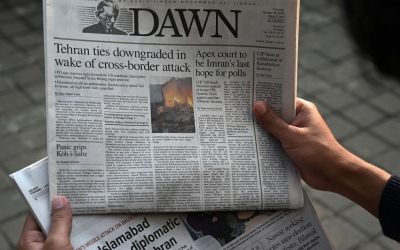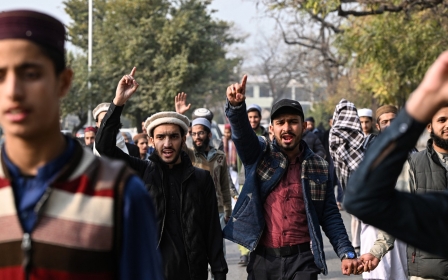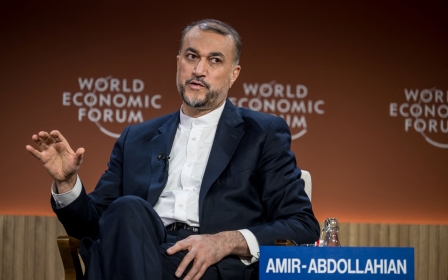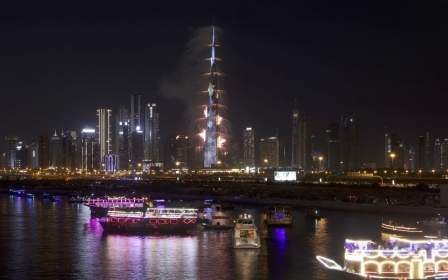Iranian press review: IRGC faces backlash over Pakistan air strikes
Experts cast doubt on IRGC’s Pakistan attacks
A week after Iran’s Islamic Revolutionary Guard Corps (IRGC) conducted missile attacks in Pakistan, former Iranian diplomats have criticised the strikes, warning they could weaken Iran's regional standing.
While the IRGC attacks on 17 January were initially praised by the establishment and officials as a response to the deadly attacks in Kerman on 3 January, independent experts and former diplomats later voiced their opposition.
Mohsen Rouhi Safat, a former Iranian deputy ambassador to Pakistan, accused IRGC strategists of a "lack of knowledge" about the politics in Iran’s neighbour to the east, citing their failure to anticipate a potential retaliatory strike from Islamabad.
“It is evident that Iran’s attack inside Pakistani territory only aimed for a short-term impact, as such strikes deliver only a single blow to terrorist groups without eradicating them,” he added, speaking to Ham Mihan.
New MEE newsletter: Jerusalem Dispatch
Sign up to get the latest insights and analysis on Israel-Palestine, alongside Turkey Unpacked and other MEE newsletters
Nozar Shafiei, an Iranian diplomacy expert, also told Ham Mihan that the IRGC’s attacks lacked sufficient assessment, emphasising that Pakistan had no choice but to conduct a similar missile attack in response.
“It was about Pakistan’s authority, as the country does not allow others to target its territory for any reason,” Shafiei said.
Other experts pointed out Pakistan’s concerns about its other neighbours potentially launching similar attacks if they did not respond to the IRGC's.
Ebrahim Rahimpour, a former deputy at Iran’s foreign ministry, drew a comparison between the attacks Iran carried out on targets in Iraq and Syria with those in Pakistan, asserting that striking the latter was a diplomatic miscalculation.
“The attack was humiliating for Pakistan. It is not a country like Iraq and Syria with weak authorities. They are also concerned that their regional enemies, India and Afghanistan, might carry out similar attacks against their territories,” Rahimpour said.
All these experts also suggested that the nature of the attacks indicated that the IRGC carried them out without informing Iran’s foreign ministry and high-ranking diplomats.
Anger over execution of protester
The execution of 23-year-old Mohammad Ghobadlou, arrested in 2022 during nationwide anti-establishment protests, has stirred widespread outrage among Iranians, as Amir Raesian, Ghobadlou's lawyer, urged the establishment to address all the shortcomings in his trial.
Ghobadlou, previously diagnosed with bipolar disorder, faced charges of murder and "corruption on Earth", and was executed before dawn on Tuesday.
Raesian, sharing his thoughts a day before the execution on the social media platform X, stated, "No order was announced to me about the execution. If judiciary officials are honest, they should disclose the number and date of issuance of this ruling. In this case, the final judgment of retribution was violated by the first branch of the Supreme Court, and after that, the same branch did not rule. We have not been notified of any other ruling."
Numerous political activists and dissidents strongly condemned Ghobadlou's execution, saying the government was employing capital punishment to instil fear and further crack down on dissent.
The Instagram account affiliated with the jailed Nobel Peace laureate Narges Mohammadi declared: "the execution of Mohammad Ghebadolou is a deliberate act of murder and a crime. In the face of murder, silence is betrayal."
Meanwhile, some social media users criticised Iranians and activists for not actively participating in the anti-execution movement and stepping back from the demands raised in the 2022 demonstrations.
Comparing the situations of political prisoners' families and dissidents living abroad, other users posted a photo of Ghobadlou’s father in the rain, in front of Evin prison, along with a photo of the daughter of Reza Pahlavi - son of the last monarch of Iran - celebrating her birthday around the same time.
One user who shared Pahlavi’s daughter's photo on X said: “In the same hours that many Iranians were concerned about the execution of Mohammad Ghobadlou, this was the Instagram post by the daughter of Reza Pahlavi. They are not one of us, and they are not sharing our pain.”
Rise in number of traditional medicine stores
Amid a medicine crisis in Iran, the number of shops selling traditional medicines and medicinal herbs, known locally as Attari, has increased dramatically. They now number around 16,000, local media reported.
In recent years, due to international sanctions and a shortage of medicines, many Iranians have turned to traditional remedies, which are often perceived as more affordable and accessible. However, the growth of unmonitored Attaries has only added to the country’s health issues.
According to a report by the Hamshahri daily, the sale of methadone, a medication widely used to treat opioid use disorder in these stores, was a cause of death for many addicts in the past year. The report highlighted the worrying trend of unregulated sales, leading to severe consequences for vulnerable individuals seeking help.
Hamshahri added that various uncertified medications for treating obesity, anorexia and other health issues, including substances aimed at addressing drug abuse and skin problems, are readily available in these herbal medicine stores.
* Iranian press review is a digest of news reports not independently verified by Middle East Eye
Middle East Eye delivers independent and unrivalled coverage and analysis of the Middle East, North Africa and beyond. To learn more about republishing this content and the associated fees, please fill out this form. More about MEE can be found here.





